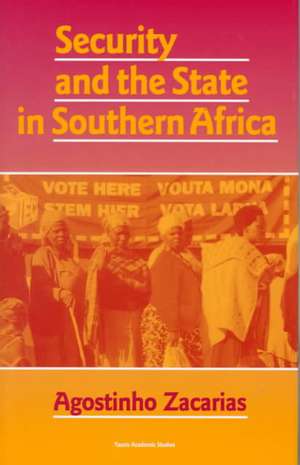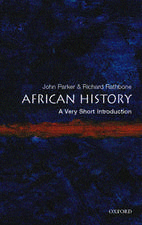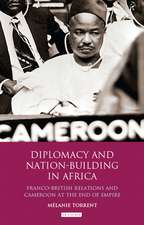Security and the State in Southern Africa
Autor Agostinho Zacariasen Limba Engleză Hardback – 30 dec 1998
Preț: 773.75 lei
Preț vechi: 1112.90 lei
-30% Nou
Puncte Express: 1161
Preț estimativ în valută:
148.08€ • 153.42$ • 123.58£
148.08€ • 153.42$ • 123.58£
Carte disponibilă
Livrare economică 01-15 martie
Preluare comenzi: 021 569.72.76
Specificații
ISBN-13: 9781860643286
ISBN-10: 1860643280
Pagini: 304
Dimensiuni: 138 x 216 x 29 mm
Greutate: 0.52 kg
Editura: Bloomsbury Publishing
Colecția I.B.Tauris
Locul publicării:London, United Kingdom
ISBN-10: 1860643280
Pagini: 304
Dimensiuni: 138 x 216 x 29 mm
Greutate: 0.52 kg
Editura: Bloomsbury Publishing
Colecția I.B.Tauris
Locul publicării:London, United Kingdom
Notă biografică
Agostinho Zacarias is Senior Lecturer in the Department of International Relations at the University of Witwatersrand, South Africa.
Cuprins
Part 1 The idea of security and southern Africa: historical overview of the concept of security - the realist school, the balance of power, the liberal school, collective security, the Marxist school, southern Africa and the concept of security; the making of the southern African security system - regional factors - the discovery of diamonds and gold, towards monopoly of the means of violence and power, South Africa and the search for regional power status, the impact of nationalist struggles, consolidation of the bloc system; the making of the southern African security system - extra-regional factors - NATO's ambiguous policies and southern Africa, Britain and South Africa, the Socialist Bloc and southern Africa, the replication of the east-west divide in southern Africa. Part 2 Legacies and inadequacies of traditional approaches to security: the legacies of the southern African security system - the southern African states, the successor colonial states, the physical base and institutions, military-related legacies, socio-economic legacies; the inadequacies of the traditional concept of security - the traditional concept, the nature of the state, the endemic nature of problems impinging on security. Part 3 New approaches to security: towards a new concept of security - the flaws in the traditional concept of national security, the traditional concept a negative definition of security, reconceptualizing security - the foundations of the concept and its relationships, how to guarantee an equilibrium between pillars, the nature of agents -changing the nature of states, strengthening the civil society, how to assure the balance between competing interests; from a system to community of security? - the region and the idea of community, the variables of security, managing the variables, how to ensure a "security society", the states, the civil society, the role of international donors; the South African defence industry and the new thinking on security - background, the SADI and its dilemmas, the proposed solutions - reformed industry, conversion and its problems, problems facing the industry, an alternative role for the SADI. Annexes: towards the southern African development community; treaty of the southern African development community.













